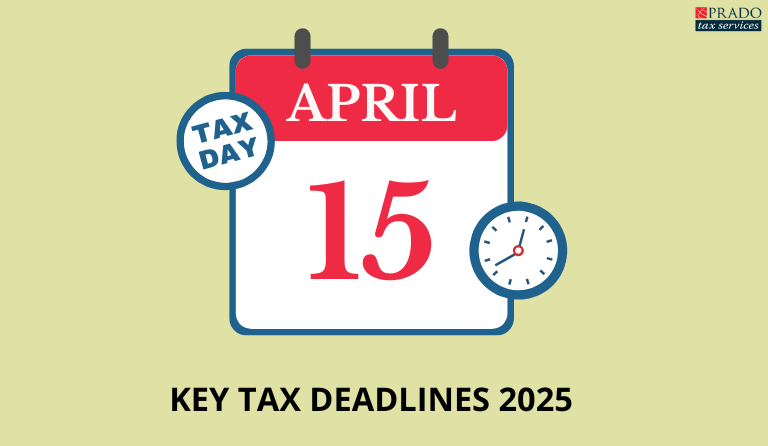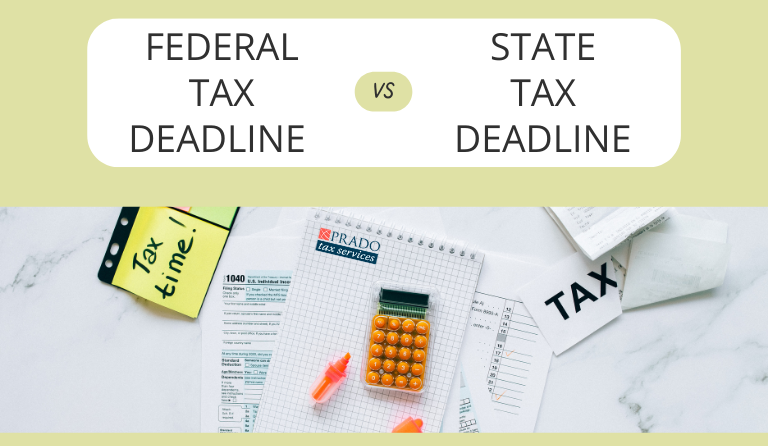Introduction
For business owners, staying on top of tax deadlines is crucial for maintaining financial stability and avoiding costly penalties. Whether you’re filing at the state or federal level, understanding the business tax deadline 2025 ensures compliance and minimizes financial risks. Missing key deadlines can result in penalties, interest charges, and even audits, which can disrupt business operations.
The state vs. federal tax system has different filing requirements, deadlines, and penalties, which makes tax planning even more complex. While the federal tax deadline 2025 applies to all U.S. businesses, state tax deadlines vary. For example, California tax laws have specific requirements, including a mandatory LLC franchise tax and different estimated tax payment schedules.
This guide will break down the key differences between state vs. federal tax deadlines, highlight the tax deadline 2025 for different business structures, and provide insights into how business owners can stay compliant and avoid unnecessary penalties.
Related article: Why Early Tax Filing is Critical for Avoiding Tax Stress in San Francisco?
Federal Business Tax Deadlines 2025: What You Need to Know
The federal tax deadline 2025 is a crucial date for businesses across the U.S. to ensure compliance with IRS regulations. Filing on time helps businesses avoid penalties, maintain financial transparency, and stay in good standing with the government. Different business structures have different filing deadlines, making it essential to understand when your business taxes are due.
Key Federal Tax Deadlines for Business Entities in 2025
C-Corporations (Form 1120): The business tax deadline 2025 for C-Corporations is April 15, 2025. Businesses can file for a six-month extension, pushing the deadline to October 15, 2025.

- S-Corporations (Form 1120S) & Partnerships (Form 1065): These entities must file their returns by March 17, 2025. If an extension is needed, businesses must submit Form 7004 to extend the deadline to September 15, 2025.
- LLC Tax Filing: The filing deadline depends on how the LLC is classified for tax purposes:
- Single-member LLCs (taxed as sole proprietorships) file under the owner’s personal tax return (Form 1040) by April 15, 2025.
- Multi-member LLCs (taxed as partnerships) must file Form 1065 by March 17, 2025.
- LLCs taxed as corporations follow the deadlines for C-Corporations or S-Corporations.
- Single-member LLCs (taxed as sole proprietorships) file under the owner’s personal tax return (Form 1040) by April 15, 2025.
- Quarterly Estimated Tax Payments: Businesses that don’t have taxes automatically withheld must make estimated tax payments throughout the year:
- Q1: April 15, 2025
- Q2: June 16, 2025 (adjusted for holiday/weekend)
- Q3: September 15, 2025
- Q4: January 15, 2026
Extension Options and How They Affect Tax Payments
If businesses need additional time to file, they can request an extension using Form 7004. However, it’s important to note that:
- An extension only applies to filing the tax return, not to tax payments.
- Businesses must estimate and pay their owed taxes by the original deadline to avoid penalties.
Proper tax planning ensures businesses meet deadlines and avoid unnecessary financial strain. In the next section, we’ll look at how state vs. federal tax deadlines differ and what businesses need to know about California tax obligations.
Related article: Why Early Tax Filing is Critical for Avoiding Tax Stress in San Francisco?
California Business Tax Deadlines 2025: What Sets Them Apart?
While the federal tax deadline of 2025 applies to businesses nationwide, each state has its own tax regulations. In California, businesses must comply with additional filing and payment requirements, enforced by the Franchise Tax Board (FTB). Understanding the California tax deadlines is essential to avoid penalties and stay in good standing with the state.
Overview of California Business Tax Obligations
California businesses are subject to various state taxes, including:
- Corporate Income Tax – Applies to C-corporations based on net income.
- Franchise Tax – Minimum $800 tax for LLCs, S-Corporations, and other entities doing business in California.
- Gross Receipts Tax (for certain businesses) – Based on revenue instead of income.
- Estimated Tax Payments – Required for corporations and LLCs expecting to owe more than $500 and $800, respectively.
Important California Business Tax Deadlines for 2025
- Corporation Tax Return (CA Form 100): Due April 15, 2025, with an automatic six-month extension to October 15, 2025 (payment still due in April).
- S-Corporation (CA Form 100S) & Partnership (CA Form 565): Due March 17, 2025, with an extension to September 15, 2025, if needed.
- LLC Franchise Tax ($800 Minimum, CA Form 568): Due April 15, 2025, for LLCs taxed as sole proprietorships or C-corporations. LLCs taxed as partnerships or S-corporations follow their respective deadlines.
- Estimated Tax Payments for 2025:
Differences in Extension Policies Compared to Federal Tax Filing
While the IRS allows extensions with Form 7004, California automatically grants a six-month filing extension, but tax payments must still be made by the original deadline to avoid interest and penalties.
Businesses operating in California need to track both state vs. federal tax deadlines to ensure full compliance. In the next section, we’ll compare key differences between business tax deadline 2025 requirements at the state and federal levels.
Federal vs. State Tax Deadlines: Key Differences That Matter
Businesses must track both state vs. federal tax deadlines, as they often don’t align. Each state has its own tax regulations, filing requirements, and payment schedules, which can create additional complexity for business owners.
Why State and Federal Tax Deadlines Don’t Always Align
- The federal tax deadline 2025 for most business entities is April 15, 2025, while certain states, including California, have different deadlines for partnerships, S-corporations, and estimated payments.
- Some states automatically extend deadlines, whereas the IRS requires businesses to file for an extension.
- State deadlines may also differ based on tax classifications, franchise taxes, and local business levies.
Varying Penalty Structures and Interest Rates for Late Payments
- The IRS imposes a 5% monthly late filing penalty, while state penalties, like those in California tax regulations, may be different.
- The California Franchise Tax Board (FTB) applies a minimum $800 franchise tax penalty if an LLC fails to file, in addition to late payment penalties.
- Interest rates on overdue state taxes may be higher or lower than federal interest rates, depending on state policies.
State-Specific Tax Requirements Beyond Federal Filings
- Many states impose additional taxes beyond federal obligations, such as gross receipts taxes, franchise taxes, or excise taxes.
- In California tax law, LLCs must file CA Form 568 and pay an $800 minimum franchise tax annually, even if they don’t generate income.
- Businesses operating in multiple states must comply with tax laws in each state, which may require separate filings beyond the business tax deadline of 2025 at the federal level.
Tax Planning Strategies to Stay Ahead of Deadlines
Proactive tax planning is essential to avoid last-minute stress and financial penalties. Here are some key strategies to help businesses stay compliant with the federal tax deadline of 2025 and state-specific obligations.
Best Practices for Managing Business Tax Obligations:
- Keep accurate financial records and update bookkeeping regularly to track taxable income and deductible expenses.
Working with an experienced tax professional ensures accuracy, maximizes deductions, and helps businesses navigate complex tax regulations.

- Use accounting software to automate tax calculations, track estimated payments, and set deadline reminders.
- Understand state vs. federal tax obligations based on your business structure and location
Conclusion: Expert Tax Assistance for Your Business
Staying ahead of the business tax deadline 2025 is crucial for financial stability and compliance. Missing deadlines can lead to penalties, interest charges, and unnecessary stress. Since state vs. federal tax deadlines don’t always align, businesses must track and meet both to avoid complications.
For business owners who want expert assistance with the federal tax deadline 2025 and California tax compliance, professional tax services can provide strategic guidance, accurate filings, and peace of mind. Prado Tax Services specializes in helping businesses navigate complex tax requirements, ensuring compliance at both federal and state levels. Contact us today to simplify your tax filings and stay ahead of deadlines!

